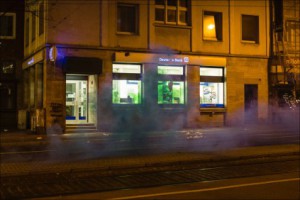On the night between the 13th and 14th of December, the Hanover branch of Deutsche Bank was attacked with paint inside and outside by direct action group the Black Bears. The group released photographs of their action and a communique explaining the reasons behind it. Deutsche Bank was specifically targeted for being one of the number one financiers of the coal industry and other major polluters responsible for the climate crisis. The action was also taken in response to the farcical COP21 ‘Climate Change Conference’ that recently took place in Paris, France.
“..An economic system in which money is earned via the destruction of our environment is unsustainable! They cannot be a part of the solution when they are obviously a part of the problem..’System Change, Not Climate Change’..fight for the overthrow of capitalism and the existing relations of domination…fight for a free and open society based on the principles of solidarity that sees itself as a part of the environment.”
for translated communique, read more
Communique translated from German into English by the Earth First! Newswire
During the night between the 13th and 14th of December, a branch of Deutsche Bank in Hanover was marked with paint on the façade and in the interior by the “Black Bears.” We take the following stance:
From November 30th until December 12th, representatives of 195 states met in Paris for the Conference of Parties (COP) 21, the so-called “Climate Change Conference.” The declared aim of these conferences, which haven taken place for more than 20 years, is to prevent “dangerous anthropogenic climate change.”[1]
In reality, it goes into issues of climate protection only in tiny steps forward—and too big is the influence of groups that deny anthropogenic climate change, of economic representatives, and of national special interests.
The negotiation results of these conferences bizarrely contradict the scientific evidence. The earlier serious efforts were begun to protect the climate, the easier it could have been to avoid more serious consequences. We lack the time for the selfish bickering of individual countries who want to achieve a competitive advantage.
Although the now-achieved global climate deal could have been a positive signal towards a rethinking of our predicament, many questions remain unanswered: How the set objectives are to be achieved when the concrete emission reduction targets of the participating countries are not sufficient? How binding should the agreement be, or is it simply an inconsequential letter of intent? What are the necessary measures—in Germany, for example—for the fastest possible exit from coal?
Moreover, some even refuse measures to reduce the emission of carbon dioxide. They want to continue to burn fossil fuels and want to compress and store the resulting greenhouse gas in the ground, but have simply not understood the problem and refuse the shift toward sustainability. This shift is a rethinking to which the climate agreement contributes little. It changes nothing about the fact that it is too often worthwhile in our current economic system to exploit and destroy the environment.
We would like to point out that this agreement, negotiated and decided by politicians, does not go far enough. Where are the investment opportunities for the millions of people who have long since realized that it is about their own future? Climate change is not about economic consequences but concrete and real experiences.
We also want to contribute to disclose some of the less obvious climate sinners.
Why the Deutsche Bank?
In addition to food speculation [2] and a series of fraud scandals, the Deutsche Bank is particularly strongly financially involved in the coal industry. In the years 2010 – 2015 the investments of Deutsche Bank in lignite alone were about 3.2 billion euros [3]. These new investments are in the climate changing and polluting coal industry – and even include investments in companies that use the most criticized mining method, mountaintop removal, where entire mountaintops are blasted away. For Deutsche Bank, it is lonely at the top of coal financing.
We say: An economic system in which money can be earned without end through the destruction of our environment is unbearable! As this cannot be a part of the solution, it is obviously part of the problem.
We say: “System Change, Not Climate Change,” and fight for the overthrow of capitalism and the existing relations of domination for an open society based on solidarity that sees itself as a part of the environment.
[1] http://unfccc.int/essential_background/convention/items/6036.php
[2] https://www.foodwatch.org/de/informieren/agrarspekulation/aktuelle-nachrichten/deutsche-bank-konferenz-war-nur-pr-show/
[3] Europas größte Klimakiller – Braunkohle und ihre Geldgeber, urgewald e. V., November 201
[H] Deutsche Bank als Kohlefinanzierer Nummer 1 markiert
In der Nacht vom 13. auf den 14.12. wurde die Filiale der Deutschen Bank am Schwarzen Bären in Hannover von uns mit Lackfarbe auf der Fassade und im Innenraum markiert. Dazu nehmen wir folgendermaßen Stellung.
Vom 30. November bis zum 12.12. haben sich Vertreter_innen von 195 Staaten in Paris zur Conference of Parties (COP) 21, der sogenannten Klimakonferenz, getroffen. Erklärtes Ziel dieser Konferenzen, die seit mehr als 20 Jahren stattfinden, ist die Verhinderung „gefährlichen menschgemachten Klimawandels“1. In der Realität geht es in Fragen des Klimaschutzes allerdings höchstens in Trippelschritten voran – zu groß ist der Einfluss von Gruppen, die einen durch Menschen verusachten Klimawandel leugnen, von Wirtschaftsvetreter_innen, von nationalen Einzelinteressen.
Die Verhandlungsergebnisse der Konferenzen widersprechen deshalb auch in skurriler Weise den wissenschaftlichen Erkenntnissen: Je früher ernste Anstrengungen zum Klimaschutz unternommen würden, desto einfacher ließen sich schlimmere Folgen vermeiden. Und für egoistisches Hickhack zur Erzielung eines Wettbewerbsvorteils für einzelne Länder fehlt schlicht die Zeit.
Auch wenn das nun erzielte globale Klimaabkommen ein positives Signal hin zu einem Umdenken sein könnte, bleiben viele Fragen unbeantwortet: Wie sollen die genannten Ziele erreicht werden, wenn die konkreten Emissionsreduktionsziele der beteiligten Staaten nicht ansatzweise ausreichen? Wie verbindlich soll die Vereinbarung sein, oder handelt es sich um eine belanglose Absichtserklärung? Kommen die notwendigen Maßnahmen auch wirklich, zum Beispiel in Deutschland der schnellstmögliche Kohleausstieg?
Darüberhinaus sind einige Maßnahmen zur Reduktion der Kohlendioxidemission abzulehnen – wer weiter fossile Energieträger verbrennen will und die dabei entstehenden Treibhausgase im Boden verpressen möchte, hat schlicht und einfach das Problem nicht verstanden und verweigert sich einem Umdenken hin zu mehr Nachhaltigkeit. Ein Umdenken, zu dem auch das Klimaabkommen wenig beiträgt – ändert es doch nichts an der Tatsache, dass es sich in unserem gegenwärtigen Wirtschaftssystem häufig lohnt, die Umwelt auszubeuten und zu zerstören.
Wir möchten darauf aufmerksam machen, dass dieses Abkommen, verhandelt und beschlossen von Regierungschef_innen und Minister_innen, nicht weit genug geht. Wo sind die Beteiligungsmöglichkeiten für die Millionen Menschen, die längst realisiert haben, dass es beim Klimawandel nicht um wirtschaftliche Konsequenzen, sondern ganz konkret um ihre eigene Zukunft geht?
Außerdem möchten wir dazu beitragen, einige der etwas weniger offensichtlichen Klimasünder offenzulegen.
Warum die Deutsche Bank?
Neben Lebensmittelspekulationen2 und einer Reihe von Betrugsskandalen engagiert sich die Deutsche Bank auch in der Kohlebranche besonders finanzstark. In den Jahren 2010 – 2015 betrugen die Investitionen der Deutschen Bank allein in Braunkohleunternehmen über 3,2 Mrd. Euro3. Dazu kommen weitere Investments in die ebenfalls klima- und umweltschädliche Steinkohleindustrie – selbst in Firmen, die die weltweit kritisierte Abbaumethode mountain top removal nutzen, bei der komplette Bergspitzen abgesprengt werden. Unter den deutschen Banken ist sie bei der Kohlefinanzierung einsame Spitze³.
Wir sagen: Ein Wirtschaftssystem, indem sich mit der Zerstörung unserer Umwelt Geld ohne Ende verdienen lässt, ist unerträglich! Es kann kein Teil der Lösung sein, es ist offensichtlich Teil des Problems. Wir sagen:
„System change, not climate change!“, und kämpfen für die Überwindung des Kapitalismus und bestehender Herrschaftsverhältnisse und für eine solidarische, offene Gesellschaft, die sich als ein Teil ihrer Umwelt versteht.
1http://unfccc.int/essential_background/convention/items/6036.php
2https://www.foodwatch.org/de/informieren/agrarspekulation/aktuelle-nachrichten/deutsche-bank-konferenz-war-nur-pr-show/
3Europas größte Klimakiller – Braunkohle und ihre Geldgeber, urgewald e. V., November 2015





